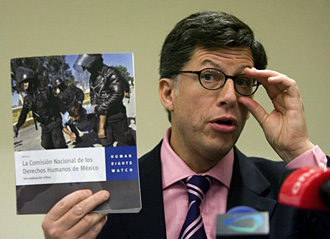
|  |  |  Editorials | Issues | July 2008 Editorials | Issues | July 2008  
Mexican Army Abuses Need Civil Trials: Human Rights Watch
 Mica Rosenberg - Reuters Mica Rosenberg - Reuters
go to original


| | The Executive Director of the Americas division of the international Human Rights Watch, Jose Miguel Vivanco speaks during a press conference in Mexico City, on February 13, 2008. Vivanco said that Mexico's National Human Rights Comission (CNDH) is not completely effective in putting an end to situations of human rights violations in Mexico. (AFP/Getty) | | |
Mexico City – Mexican soldiers, accused of killing seven people and torturing suspects in their battle against drug cartels, should be tried in civilian courts for their crimes, Human Rights Watch said Monday.

Mexico's national rights commission, an independent government body, presented eight formal complaints against the army for rights abuses last week, including forced disappearances, illegal detention and electric shock torture.

Jose Miguel Vivanco, director for Latin America of the New York-based Human Rights Watch, said the claims would go nowhere if the army was allowed to try itself. “The presumption is that the military are capable of self-regulation ... I think that is an illusion,” Vivanco told Reuters.

Since President Felipe Calderón took office in late 2006, he has deployed thousands of troops to fight cartels. But the army has failed to stop the violence with over 4,000 drug murders since then, as rivals kill each other and police.

The Mexican commission said that since Calderón began his military-backed assault on drug gangs seven people have been gunned down or beaten to death by the army.

The army has said it will investigate the cases and has started disciplinary procedures in some of the cases.

Last October, a Mexican court sentenced four soldiers to up to 40 years in prison for raping nine women in 2006, the first time troops have been tried in a civilian court. But Vivanco said the recommendations by the commission, instead of encouraging more civilian trials, asked the military justice system to resolve the complaints. “When security forces – especially the army – engage in human rights abuses, that type of conduct should be understood as common crimes and therefore prosecuted by civilian prosecutors,” said Vivanco.

“Only then are things going to start changing,” he added.

For years rights groups have complained that Mexican security forces use torture to elicit confessions.

Vivanco said the human rights provisions attached to Washington's recent pledge of $400 million to help fund Calderón's drug war should force the Mexico to consider more civil trials for military personnel.

ARMY CORRUPTION?

Despite the reports of abuses by the army, political analysts say troops are Calderón's only real option in a country where as many as half the police could be in the pay of drug gangs.

But Vivanco said the army could fall prey to the same type of corruption if soldiers are not properly trained.

Already soldiers in border towns where the bulk of drugs cross into the United States have been offered hundreds of thousands of dollars to turn a blind eye to certain shipments or call off anti-drug operations.

Vivanco said despite talk supporting human rights, Mexico continues to ignore serious violations.

“This government keeps arguing that human rights is an important component of domestic and foreign policy, but I am not convinced. They are willing to subordinate human rights for other types of concerns,” he said.

(Editing by Anthony Boadle) |

 |
|  |



